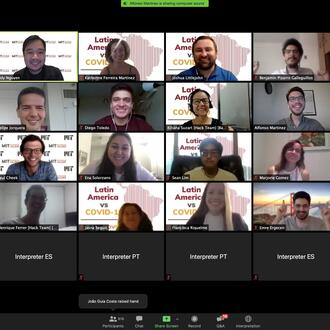Two principles and one concrete proposal to accelerate scientific innovation and end the COVID-19 pandemic
By
It is clear that the COVID-19 pandemic requires a scientific response. We need tests, treatments, and vaccines to end the nightmare. However, the country’s investment in science to date has been scattershot despite the potential of scientific innovation to generate extremely high returns.
Pierre Azoulay is the International Programs Professor of Management at the MIT Sloan School of Management and a Research Associate at the National Bureau of Economic Research.
Based on prior research on life-science breakthroughs, the government should espouse two broad principles for orchestrating innovation activities dedicated to bringing the pandemic to an end.
The first principle is to ensure a diversity of investments. Scientific investments are highly uncertain. Indeed, most of them fail. To mitigate this risk, we need to fund a diverse portfolio of projects. We need to support science going in a lot of different directions and accept that many of them will go nowhere.
This will also help avoid the pitfall of getting caught up in the hype of early signs of progress. Vaccines are a good example. While there is talk of creating a vaccine by next year, we need to accept that this is not a certainty. We do not have an HIV vaccine and it is not for lack of trying. Vaccine research needs to be a part of the overall portfolio, not the main star. We also need to invest in improving tests, discovering treatments, modernizing contact tracing methods, and improving the predictive power of epidemiological modelling.
The second principle is to support different timelines. It is risky to invest in emergency mode because it puts too much emphasis on short-term returns. For example, we have heard some positive media reports about the use ofhydroxychloroquine to treat virus patients. However, we need to test and retest before we reach statistically significant results. Otherwise, we could start ordering that medication by the bushel without the support of clinical data. Not only could this be harmful to patients, it could also be at the detriment of funding other projects.
We do not know how long this battle will last. The most realistic scenario is that it will not be completely won for a long time, but rather made tolerable in the medium term. It is also not the last pathogen we will ever face. Rather than operating in emergency mode, we need to fund short-, medium-, and long-term projects.
Turning these principles into concrete actions falls mostly on governments worldwide. There is no reason to believe that private-sector firms will supply the necessary amount of diversity in approaches or timelines. There is a need for sharing information, yet the private sector is not incentivized to collaborate with competitors. The market also tends to put too many eggs in too few baskets. This is apparent in the lack of PPE. And what happens if demand for a vaccine disappears? Private companies could simply cancel vaccine projects.
We need the government to step in and lead innovation efforts. In WWII, the government created the National Defense Research Committee (NDRC) to support innovation that helped win the war. The committee orchestrated all kinds of projects, such as scaling up antimalarial drugs and manufacturing penicillin. We need a similar effort to commit to funding innovation to end the COVID-19 pandemic – and future pandemics.
A federal Covid-19 Defense Research Committee (CDRC) could orchestrate previously disparate efforts and put the diversity principles into action. It could identify, in real time, areas that need more funding and share data about ongoing efforts. Most importantly, it could require collaboration among competitors, even if on a temporary basis for the good of society.
A CDRC could also ensure appropriate speed and levels of spending on scientific innovation. The current funding from grants is a slow process. And many labs are still shuttered due to lack of funding or lockdowns. We need to let all labs operate as essential businesses – not just the usual suspects who are in the news for working on vaccines and treatments.
To be sure, this would require a change in mindset about the government’s role in the pandemic and our willingness to invest in scientific innovation. A lot of investments will not pay off. But that one in a thousand unexpected idea could pay off for all of the other investments. That is the nature of scientific research.
Pierre Azoulay is the International Programs Professor of Management at the MIT Sloan School of Management, and a Research Associate at the National Bureau of Economic Research. His research focuses on the foundations of life-science breakthroughs. He is the coauthor of “Beat Covid-19 with innovation,” published in Science Magazine.



